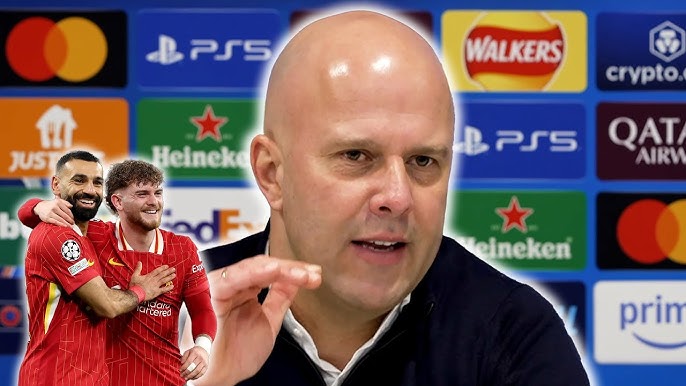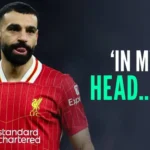Slot explains why Salah is struggling to score for Liverpool

Mo Salah has always been the man that Liverpool fans looked up to when the team needed goals, when the team needed hope, and when the team needed a moment of magic. From the day he arrived from Roma, he became more than just a forward, he became a legend in the making, a player whose left foot could silence stadiums and make Anfield shake with joy. For years, he was unstoppable. Defenders feared him, goalkeepers dreaded him, and rival fans could only watch in pain as he danced past their backlines and scored goal after goal. But football has a way of changing, and now the same questions that were once unthinkable are being asked out loud: why is Mo Salah struggling to score for Liverpool? Why is the king of Anfield not producing the same goals from open play like he used to?
Liverpool’s new head coach Arne Slot has finally opened up on this question. Speaking honestly and carefully, Slot gave insight into Salah’s situation, his struggles, and the challenges facing Liverpool’s entire attack. And while many fans may want to point fingers directly at Salah, Slot explained that the issue is bigger than just one player. It is about the system, about the opponents, about the age factor, and about the adjustments that the team is going through in a new era.
Slot pointed out a truth that many might not want to hear: Salah is not scoring as many open-play goals because teams have learned. They have studied. They have adjusted. The Egyptian king used to find so much space in behind, but now the doors are closed, the walls are built, and the defenders have found ways to limit him. The goals are still coming, but many are from penalties, set-pieces, or rare counter-attacks, not the free-flowing open-play moments that made him famous.
The Dutchman even went as far as to compare Salah’s numbers from last season. In the second half of that campaign, Salah scored 12 goals, but only six came from open play. That trend has continued into this season. The raw numbers might not look too bad, but the truth is clear: the fearsome open-play machine is not firing like before. And the reason, according to Slot, is simple—Liverpool are being treated differently. Rivals no longer risk playing out from the back. Rivals no longer leave spaces behind. Instead, they go long, they defend deeper, and they focus heavily on Salah’s movement.
Slot gave an example that perfectly described the situation. When Liverpool beat Manchester United away last season, they won because United tried to play out from the back. Salah and his teammates pressed them, stole the ball, and punished them. But when United came to Anfield, goalkeeper Andre Onana refused to take the same risk. He went long every time. That change killed Liverpool’s pressing traps and reduced Salah’s chances. This is the type of adjustment that is now happening across the Premier League, and it is affecting Salah’s ability to score from open play.
But there is also another part of the story, one that is harder to talk about. Salah is 33 years old. He has been at the very top of football for almost a decade. He has carried Liverpool on his shoulders season after season. The energy, the sharpness, the explosiveness—age is beginning to test these things. Slot admitted that it is something they must consider. Salah can still deliver, no doubt, but his role is shifting. He is no longer the unstoppable machine he once was, he is now a leader, a guide, and part of a system that is trying to evolve with new faces.
Liverpool’s attack has been reshaped with the arrival of big-money signing Alexander Isak and the creative brilliance of Florian Wirtz. This has naturally forced Salah into a slightly different role. He is still central, but he is sharing the responsibility more. The goals are expected to come from many areas now, not just from him. That transition, however, takes time. It requires patience. It requires chemistry. And Slot has made it clear that the more this new Liverpool plays together, the more dangerous they will become.
Critics were quick to jump when Slot rested Salah against Galatasaray in the Champions League. How could he bench his biggest star in such a crucial game? Was it a mistake? The defeat only made the noise louder. But Slot defended his decision, explaining that sometimes even legends need rest, especially when they are approaching the latter stages of their careers. It was not an insult, but a long-term plan to keep Salah fresh for the games that matter most.
Alan Shearer, one of the greatest strikers the Premier League has ever seen, also added his voice to the discussion. Shearer said he believed Salah would get back to scoring regularly. He reminded fans that world-class players do not simply lose their quality overnight. They adapt, they evolve, and they find new ways to shine. For Shearer, it is only a matter of time before Salah clicks again with this new system.
For the fans, the waiting is painful. They are used to Salah being the guarantee, the man who never lets them down. Every game, every stadium, they want to see him run to the corner flag, arms wide open, smile on his face. But football is a game of cycles. The question is no longer if Salah can carry Liverpool alone, but if Liverpool can now carry Salah into a new phase of his career.
Chelsea awaits Liverpool in the next Premier League clash. It is another big test, another stage where Salah will be under the spotlight. Can he rise again? Can he deliver? Or will the doubts grow louder? For Slot, the message is clear: patience. For the fans, the message is hope. For Salah, the challenge is personal.
The beauty of Salah’s story is that he has always been doubted at different stages of his career. From being called a Chelsea reject, to being mocked in Italy, to being dismissed as a one-season wonder in his first year at Liverpool, he has always answered with goals, with trophies, and with unforgettable moments. This is just another chapter. Another moment where the critics speak, and Salah must prove them wrong.
The truth is, Liverpool are in transition. Klopp’s era is over, Slot’s era is just beginning. New players, new tactics, new systems—it all takes time. The forward line is adjusting, the midfield is adapting, and the defense is learning again. Salah’s struggles are part of this bigger picture. They are not the end, they are the growing pains of something new.
When Salah walks onto the pitch against Chelsea, the cameras will follow his every move. The fans will sing his name, the defenders will track his runs, and the pressure will be heavy. But this is where legends are made. Not when things are easy, but when things are tough. Salah has been Liverpool’s king for seven years, and even now, at 33, with questions being asked, he remains the man everyone looks to.
Arne Slot knows it, Alan Shearer knows it, and deep down, every Liverpool fan knows it too—Salah still has fire in him. It might burn differently now, but it is still there. The story is not finished. The goals will come again.
And when they do, the same people who doubted will once again stand in awe of the Egyptian King.Because legends never fade. They simply change their shape. And Mohamed Salah is still a legend of Liverpool Football Club















